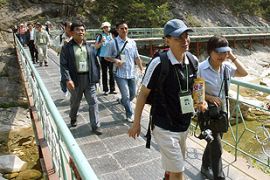N Korea unveils resort restrictions
Expulsion of South Korean staff follows spat over fatal shooting of southern tourist.

The move would include officials from the state-run Korea tourism organisation and government officials in charge of a newly built facility for reunion of separated families, it said.
The South suspended tourist trips to Kumgang immediately after the fatal shooting of Park Wang-Ja, a South Korean tourist, on July 11.
Park was killed by one or more soldiers after she strayed into a military area while walking on a beach.
The North, which blames the South for the incident, insisted Park fled when challenged and did not stop despite warning shots.
Seoul’s regrets
South Korea’s unification ministry expressed regret, urging the North to “stop escalating tensions and resolve the issue swiftly”.
A total of 164 South Koreans are staying in the area, including two officials of the Korea tourism organisation and nine workers from three South Korean companies that built the reunion facility.
But there are no government officials staying in the area, the ministry said.
The North’s statement also said the movement of South Koreans and their vehicles passing through the inter-Korean border in the Kumgang area would be strictly limited and controlled.
“Strong military sanctions shall be applied as regards all violations, big and small, in the tourist area of mountain Kumgang and the area under the military control,” the statement said.
Inquiry rejected
The North’s military has flatly rejected Seoul’s call for a joint on-site investigation of Park’s killing, and denounced the South for “misleading public opinion at home and abroad” over the incident.
Seoul has suspended aid to the North, raised the issue at the Asean regional forum last month and on Friday rejected a request by a pro-unification civilian group to visit the North.
Lee Myung-Bak, the South Korean president, came to power earlier this year, vowing to inject more realism into Seoul’s reunification strategy.
The two countries have remained technically at war since their 1950-1953 conflict ended only in an armistice and not a peace treaty.